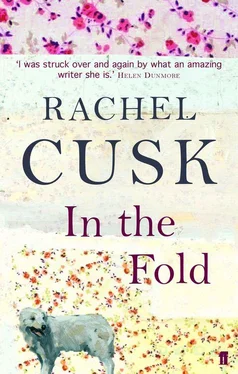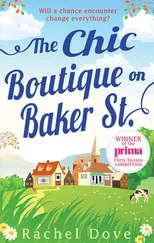Rachel Cusk - In the Fold
Здесь есть возможность читать онлайн «Rachel Cusk - In the Fold» весь текст электронной книги совершенно бесплатно (целиком полную версию без сокращений). В некоторых случаях можно слушать аудио, скачать через торрент в формате fb2 и присутствует краткое содержание. Год выпуска: 2006, Издательство: Faber & Faber, Жанр: Современная проза, на английском языке. Описание произведения, (предисловие) а так же отзывы посетителей доступны на портале библиотеки ЛибКат.
- Название:In the Fold
- Автор:
- Издательство:Faber & Faber
- Жанр:
- Год:2006
- ISBN:нет данных
- Рейтинг книги:3 / 5. Голосов: 1
-
Избранное:Добавить в избранное
- Отзывы:
-
Ваша оценка:
- 60
- 1
- 2
- 3
- 4
- 5
In the Fold: краткое содержание, описание и аннотация
Предлагаем к чтению аннотацию, описание, краткое содержание или предисловие (зависит от того, что написал сам автор книги «In the Fold»). Если вы не нашли необходимую информацию о книге — напишите в комментариях, мы постараемся отыскать её.
In the Fold — читать онлайн бесплатно полную книгу (весь текст) целиком
Ниже представлен текст книги, разбитый по страницам. Система сохранения места последней прочитанной страницы, позволяет с удобством читать онлайн бесплатно книгу «In the Fold», без необходимости каждый раз заново искать на чём Вы остановились. Поставьте закладку, и сможете в любой момент перейти на страницу, на которой закончили чтение.
Интервал:
Закладка:
‘I think we’ll be off tomorrow.’
In the shuttered, discontinuous light I waited for his reply.
‘That’s a shame,’ he said. ‘We expected you to stay longer.’
‘There are some problems at home I’ve got to sort out.’
A moment earlier I had felt a pressing need to make this disclosure. Now that I had, I felt vulnerable and ashamed.
‘We thought that might be the case,’ said Adam presently, with ostentatious care. He stared keenly through the windscreen.
‘The balcony fell off our house,’ I said. ‘I should really go and sort it out.’
There was a silence, during which Adam failed to recognise his obligation to enquire about the dramatic event to which I had just referred. Like some predatory animal my anger left off the trail of Rebecca and swerved hungrily towards this new source of affront. Did he think I was lying? That ‘we’!
‘It nearly killed me,’ I said. ‘It missed me by a foot.’
Still he did not speak. I thought that I might hit him. I wanted to — there was a hot feeling of excitement in my chest that made the prospect of hitting Adam seem infinitely satisfying, like the prospect of taking flight. I did not, however, hit him. I began to feel jittery and light-headed, and my hands trembled on my thighs. I looked out of the window to the side of me at the rushing hedgerows. There was a leaden sensation in my stomach. It seemed that Adam and I were no longer friends. I felt certain that he would agree, but what perplexed me was how our brief conversation, in which we had taken such different parts, could have led to both of us forming this conclusion. I supposed that he could have decided it at some earlier point in my visit. I felt then that I had exposed myself to him in every particular. I felt his solidity, his self-satisfaction, in opposition to my transience. I imagined him and Lisa laughing at Hamish and at me; I imagined, ashamed, the clarity with which they had perceived that I scorned their suburban existence, and though I scorned it still, this idea, along with their beige carpets and their aspirations and the fact especially of their hospitality, put them somehow in the right. It was one of Rebecca’s criticisms of me that I was judgmental, as though I were the last advocate of an otherwise extinct morality. What she meant was that the disapproval made me immoral myself, by which I had always understood her to be saying that her lack of discrimination made discrimination a crime.
‘Lisa’s bringing the kids up at lunchtime to see the lambs,’ said Adam, as though further to assert the simple virtues of his existence, as opposed to the snarling, duplicitous chaos of mine.
‘Will she bring Hamish?’ I said.
Adam smiled.
‘Well, I don’t think she can leave him at home,’ he said.
‘That’s nice of her,’ I said, more petulantly than I’d meant to, so that as we were bumping up the track Adam turned his head to glance at me.
There were only six pregnant ewes in the pens. I left Adam to sit with them while I loitered around the barns in a pretence of efficiency, slowly shovelling dirty straw into the wheelbarrow. Sometimes I went out and looked at the vivid blue sea below, its surface creased by wind. I saw little boats charging madly up and down. The hours passed, forced through the tiny aperture in my angry feelings of subjection. I gave the orphaned lambs their milk, sickened by the greed with which they jostled and slobbered at the teat. They kept pulling it nearly out of my hands. I saw that Adam had moved two of the ewes to their own stalls.
‘Can you take one of these?’ he called.
Reluctantly I plodded to the stalls. The ewes stood panting rapidly and staring straight ahead with their close-together eyes. Adam was sitting on a stool in one of the stalls. I went into the other.
‘Good girl,’ I heard him say over the divide.
I sat on the stool, where the ewe’s broad, woolly haunches presented themselves to me. Her sides moved in and out quickly. I stared at her livid, quivering genitals. The smell of straw and muck was pleasanter in this enclosed space than when it was mixed with the wind outside. I sat and waited, as I had seen Adam and Beverly do.
‘Is there something I should be doing?’ I called.
‘Not unless her insides start coming out,’ said Adam ominously.
‘What do I do then?’
‘I don’t know,’ said Adam after a pause. ‘I get Beverly to do those. I think you have to sort of shove them back in.’
I stared around the battered wooden sides of the stall and then put my head back and looked up at the rafters. A group of pigeons were up there and they looked quizzically down at me. Outside the wind banged the gates and rattled them against their hinges. The ewe panted. Time passed. Her little sharp breaths seemed to buffer me; they broke on me like little waves on a smooth, empty beach. I marvelled at her containment. It seemed incredible to me that anything would issue from her impassive bulk. She was without sensibility; she was like a rock, a boulder. In the presence of her rudimentary life I had a sense of the superfluity of certain things and the necessity of others.
‘Were you given a cause?’ said Adam from the other stall.
‘For what?’
‘For the balcony collapsing.’
‘Frost damage,’ I said. ‘A plant grew through a crack in the stone.’
There was a pause.
‘You’ll have problems with insurance,’ he observed.
‘I know.’
‘If I were you,’ he said, ‘I’d look at reinforced concrete to replace it. It’s far cheaper and much easier to secure into the outside wall.’
‘It’s a listed building,’ I said.
‘That’s no problem. There’s no problem using a concrete slab. As long as the appearance is the same. Was the limestone painted?’
‘Yes.’
‘Well, there you go. There’s only so far a listed buildings consent will go in specifying the nature of the materials. You want to find someone who’ll run it straight into the wall rather than taking out sections of the stone. Don’t listen if they say they can’t do it. You’ll save yourselves three or four thousand pounds.’
‘Thanks,’ I said.
I leaned back against the frayed wood and thick splinters pushed against my shirt. The ewe shifted a little on her delicate hooves. I closed my eyes. The wind descanted distantly.
‘— continual maintenance, that’s the problem,’ Adam said from next door.
‘What’s that?’ I said.
‘I was saying you’re constantly having to maintain them. Old buildings. It can be a real headache. The maintenance costs on an old building can be a real drain. Personally I’d rather spend the money on something else.’
‘I think mine’s coming,’ I said.
A rounded, shiny-blue protuberance, like a knuckle, had appeared amidst the ewe’s red, fleshy folds. It kept receding and returning, each time a little more substantially.
‘Mine too,’ Adam said. ‘I worked out that the equity on a new build is actually more stable once you factor in the running costs.’
The ewe was panting even faster: while not moving at all, she was like something running at full tilt. The knuckle edged its way out. Now it was a parcel, mottled and tightly packed, being forced through a letterbox.
‘Should I pull it out?’ I said.
‘No,’ said Adam. ‘She does it all. There, mine’s out.’ I heard a rustle of straw from his stall. ‘In Bath, though,’ he continued, ‘I should say you’d get a lot of value added just from the heritage point of view. It’s the Georgian factor — you can’t go wrong, really, in Bath. Ridiculous, isn’t it? The money people will spend on something that’s basically just an illusion.’
I turned back to my ewe and saw the parcel, greasy and bright, suspended in a long moment of obstruction before it suddenly slithered out in a rush and fell with a thud into the straw. There was a smell of old blood. I watched as it woke itself, unfolding its legs and nosing blindly at the remnants of the bag it had come in, before scrambling unsteadily to its feet. It stood there, quivering, while the ewe licked it and carelessly shoved it around. I realised my heart was thumping. I met the ewe’s depthless brown gaze. The four ewes left in the pen bayed and barged against the metal poles with their massive bodies. I inched around the edge of the stall and let myself out.
Читать дальшеИнтервал:
Закладка:
Похожие книги на «In the Fold»
Представляем Вашему вниманию похожие книги на «In the Fold» списком для выбора. Мы отобрали схожую по названию и смыслу литературу в надежде предоставить читателям больше вариантов отыскать новые, интересные, ещё непрочитанные произведения.
Обсуждение, отзывы о книге «In the Fold» и просто собственные мнения читателей. Оставьте ваши комментарии, напишите, что Вы думаете о произведении, его смысле или главных героях. Укажите что конкретно понравилось, а что нет, и почему Вы так считаете.












